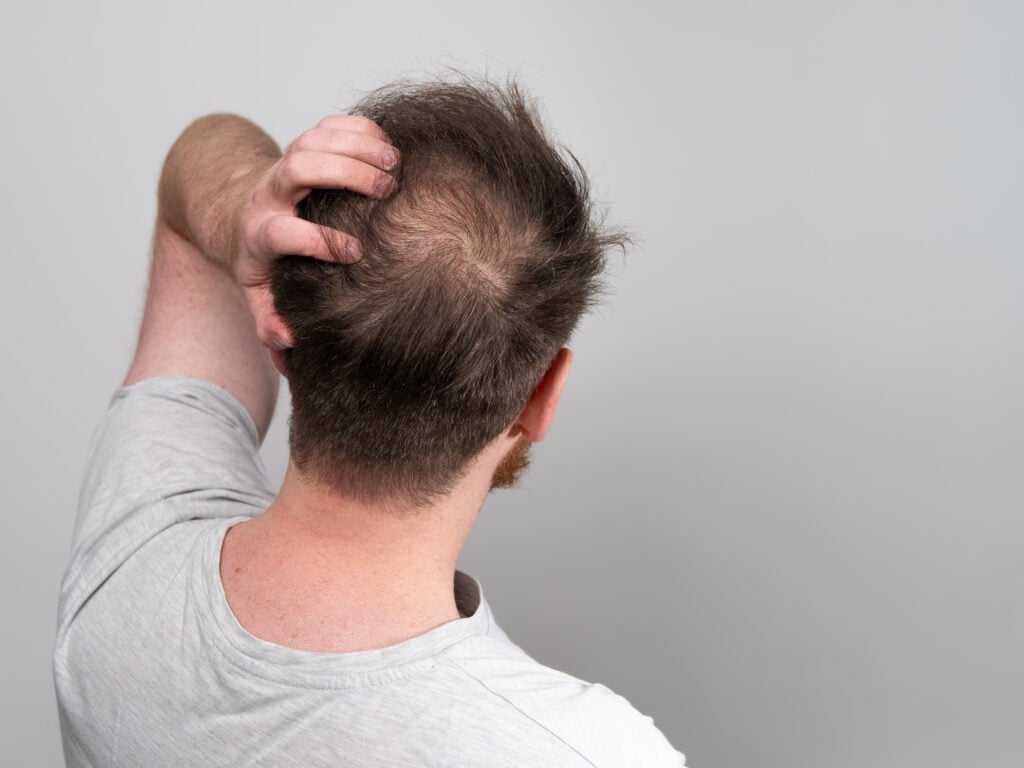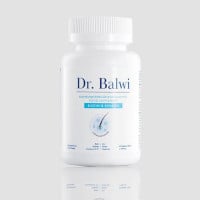
Methylsulfonylmethane (MSM) Supplements For Hair Loss
Hair loss is a very common issue with multiple potential causes. It is something that can affect anyone, regardless of age, gender, or race. Understandably, loss of hair can cause many to feel distress and a loss of confidence and self-esteem, leading them to explore treatment options for regaining their locks.
Treatments for hair loss vary from natural supplements and medications, to surgical interventions. Lately, there has been a lot written online about methylsulfonylmethane (also referred to as MSM) as an effective way to increase hair growth. In this article, we’ll be explaining what methylsulfonylmethane is, how MSM supplements work, and who can benefit most from taking this supplement.
- What is Methylsulfonylmethane (MSM)?
- How MSM Supports Hair Growth: What Science Tells Us
- MSM vs Other Hair Supplements: What’s the Difference?
- How to Take MSM for Hair Growth
- Are There Any Risks or Side Effects of MSM?
- Pairing MSM with Professional Hair Loss Treatments
- Conclusion: Is MSM Worth Trying?
What is Methylsulfonylmethane (MSM)?

How MSM Supports Hair Growth: What Science Tells Us
Methylsulfonylmethane (MSM) is a naturally occurring sulphur compound commonly used to treat inflammation in the joints and skin issues. Recently, it has gained popularity as a supplement for boosting hair health and reducing hair loss, but does research support these claims?
Earlier studies on animals concluded that topical use of MSM in conjunction with minoxidil had a positive effect on hair growth. Human trials have been similarly positive, with one study reporting that 82% of its participants experienced a noticeable reduction in hair loss.
While studies have found MSM to be effective in some cases of hair loss, researchers are still studying how precisely it works. The aforementioned trial which found MSM to be effective in restoring hair in humans also found that it improved the overall volume of the hair and reduced brittleness.
From this above information, scientists have suggested that MSM works by strengthening keratin molecule bonds in the hair strand. MSM’s proven use as an anti-inflammatory can also be beneficial to overall scalp health. While this makes it a suitable course of treatment for conditions like telogen effluvium, it is not considered appropriate for patients with androgenetic alopecia.
MSM vs Other Hair Supplements: What’s the Difference?
When it comes to supporting your hair health, there are a number of supplements you can take to aid in strengthening and retaining your crowning glory. Here are some of the most well-known supplements for hair loss:
- Biotin
- Zinc
- Saw Palmetto
- Iron
While some of the above nutrients have been proven to improve hair health overall (zinc, iron), research on others (biotin, saw palmetto) have shown more limited results. When compared to the other supplements on the market that purport to improve hair retention and growth, MSM falls somewhere in the middle – its use might be more limited than supplements like zinc and iron, but research supports that it is at least as effective as saw palmetto.
Before incorporating any supplements into your diet, we recommend that you first consult with your GP. By doing so, you can develop a course of treatment together that can include the nutrients best suited to your specific hair concerns.
How to Take MSM for Hair Growth

As we’ve already mentioned, you should speak to your doctor before beginning any new dietary supplement. Speaking to a medical professional will allow you to ascertain if MSM is the right choice for you and if it will cause any problems with other supplements you are taking.
With the advice of a doctor, you may begin taking MSM in pill or powder form. While MSM is naturally occurring in some foods, it does not occur in high enough volumes to provide the desired results in hair retention when consumed through diet alone.
Your GP should recommend that you begin with the lowest available dose of the supplement, unless they believe that your specific condition would benefit from a higher dose at the beginning. From there, you can work together to gradually increase the dose as/if needed.
Realistic Expectations: What Results Can You Expect?
The efficacy of MSM supplements for hair loss depends on the underlying causes of your hair loss, the dosage of MSM taken, and the frequency with which you take the supplement. In cases of stress-related hair loss, those taking the supplement daily can expect to see the full results within 3-6 months of use.
Are There Any Risks or Side Effects of MSM?
To date, research has found few negative side effects linked to MSM. There has been some reporting of side effects such as diarrhea, bloating, headaches, and nausea, but these do not appear to be widespread.
In some animal trials, topical applications of MSM were found to cause minor skin and eye irritation, but nothing similar has been noted in human studies to date. Should you experience any of these issues, speak to your doctor immediately.
Pairing MSM with Professional Hair Loss Treatments

While methylsulfonylmethane supplements may not be an effective treatment for all forms of hair loss, it can provide complementary support for those undergoing other forms of hair restoration treatments. For example, those who opt for a hair transplant may consider MSM supplements to help strengthen the growing strands of their newly-transplanted grafts.
Conclusion: Is MSM Worth Trying?
Depending on the underlying cause of your hair loss, MSM could be beneficial. In cases of stress-related hair loss, methylsulfonylmethane shows promising results. In cases of androgenetic alopecia, alopecia areata, or other forms of hair loss and/or hair thinning, MSM supplements might be considered as part of a holistic approach to hair growth and retention, though is unlikely to provide much in the way of results when taken on its own.
If you’d like to learn more about your specific kind of hair loss, we recommend speaking to your doctor or contacting one of our experts for a free hair analysis.
FAQs
Can MSM be used by both men and women?
Yes, MSM supplements are suitable for both men and women experiencing hair loss. However, the results may vary depending on the underlying cause of the hair loss and the individual’s overall health.
At what age is it safe to start taking MSM supplements for hair growth?
MSM is generally considered safe for adults over the age of 18. However, anyone considering it—especially teenagers or older adults with pre-existing conditions—should consult with a healthcare provider first.
How long does it typically take to see results from MSM supplements for hair growth?
Most people who respond well to MSM may begin seeing visible improvements in hair thickness and reduced shedding within 3 to 6 months of consistent daily use.
Is MSM more effective when taken orally or applied topically?
While both oral and topical forms of MSM have shown some benefits in studies, oral supplementation is more commonly used for systemic effects such as promoting hair growth. Topical use is less researched in humans and is usually paired with other treatments like minoxidil.
Can you combine MSM with minoxidil or finasteride?
Yes, MSM can be safely used alongside other hair loss treatments such as minoxidil or finasteride. In fact, some studies suggest that MSM u003ca href=u0022https://pubmed.ncbi.nlm.nih.gov/36591763/u0022u003emay enhance the effects of topical minoxidilu003c/au003e. Always consult a healthcare provider before combining treatments.
Is MSM suitable for vegans and vegetarians?
Most MSM supplements are synthetic and not derived from animal products, making them suitable for vegans and vegetarians. However, it is important to check the label for any additional ingredients or binding agents.
What dosage of MSM is generally recommended for hair growth?
There is no universally agreed-upon dosage, but most supplements range from 1,000 mg to 3,000 mg per day. It is recommended to start with a lower dose and adjust gradually under medical supervision.
Does MSM interact with any medications?
While MSM is generally well tolerated, it may interact with blood-thinning medications or drugs that affect liver function. Individuals taking regular prescription medication should consult their GP before starting MSM.
Are there foods naturally rich in MSM that could support hair health?
MSM is naturally found in small amounts in foods like leafy greens, tomatoes, alfalfa sprouts, and some fruits. However, the quantities are typically too low to have a significant effect on hair growth.


